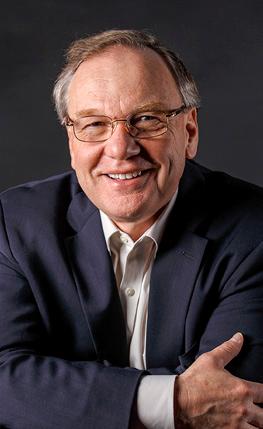
8 minute read
THE BLESSING OF BEING POOR IN SPIRIT
Seeing the multitudes, Jesus went up on a hillside and began to teach the people. “Blessed are the poor in spirit, for theirs is the kingdom of heaven.”
Admitting spiritual poverty was considered a weakness in the days of Jesus. It still is today. Jesus turned it into a rich blessing by promising to exchange our poverty of spirit for the riches of His grace.
To be poor in spirit means to feel a deficiency and need because we have sinned and come short of the glory of God. In the spiritual life, that is good. To be poor in spirit is to be never satisfied with the present growth in one’s spiritual life, but to be always reaching up for more of the grace of Christ.
Poor in spirit believers look to Jesus and desire to be more like Him. They are responding to the constant drawing of the Holy Spirit toward Christ and, as a result, receiving more of the righteousness of Christ.

People who are poor in spirit are not making a parade of their poverty. Instead of focusing on sins committed and personal failures, they focus on Christ’s righteousness.
As they witness more of the infinite love and compassion of God, their hearts are melted. They sense a personal lack of God’s righteousness, but, instead of calling attention to it, seek continually for more of the grace of Christ and for the robe of His righteousness.
The poor in spirit recognize their need for forgiveness of sin and cleansing from guilt, which Christ purchased for them upon the cross. Forgiveness is a gift to those willing to receive it. They see the good works which they have done are all mingled with self and sin. They can take no credit for any growth in the spiritual life. It is all of grace. Salvation is a gift.
Blessed are the poor in spirit because they admit and recognize their need, and obtain by grace, the incredible gift of Christ and His righteousness. Jesus said, “I have not come to call the righteous, but sinners to repentance.” It is the needy that Jesus is seeking, and they will be blessed.
The main thing the poor in spirit need to do is look continually to Jesus and believe in Him whom the Father has sent. When the people came to Jesus, they asked Him, “What shall we do, that we might work the works of God?” Jesus answered, “This is the work of God, that you believe in Him whom He has sent.”
The reason we do not have more of the Spirit and power of God is that we are satisfied with what we already have. There is a tendency among Christians to make a certain amount of growth in their spiritual life and then stop. No further progress is made. They cease to grow in grace and in the knowledge of our Lord Jesus Christ.

I’ve struggled with this at different times in my own spiritual life. It is Satan’s great work to get us to look at ourselves for spiritual strength instead of going to Jesus. If we fall for it, spiritual failure soon follows.
Being a follower of Jesus Christ demands constant spiritual growth. To draw constantly upon His grace, we must feel our need. Spiritual pride will not admit any spiritual need. The result is slow spiritual death. Spiritual humility will admit the need for constant spiritual growth by reading God’s word daily, praying and being active in ministry to others in Christ’s name. What will the kingdom of God look like on this earth? It will look like those who are willing to admit they are poor in spirit. Kingdom of God people will hunger and thirst for more of Jesus. They will seek first the kingdom of God and His righteousness. They will yearn to be filled with the baptism of the Holy Spirit. Kingdom of God people will behold the glory of God in the face of Jesus and will see with greater clarity His compassion, kindness, forgiveness, unselfishness, servant’s heart, generosity and love. By beholding, they will be changed into His image. Active in ministry, they will seek to bring healing to the brokenhearted, visit those in prison, care for the widows and orphans, feed the hungry and seek the lost. Kingdom of God people revitalize churches. Are you ready for the challenge?
JOHN FREEDMAN North Pacific Union president
Copyright © 2023 July/August 2023 Vol. 118, No. 4
Gleaner (ISSN 0746-5874) is published bimonthly for a total of 6 issues per year by the North Pacific Union Conference of Seventh-day Adventists®, 5709 N. 20th St., Ridgefield, WA 98642. It is printed and mailed at Pacific Press Publishing Association , 1350 N. Kings Rd., Nampa, ID 83687-3193. Subscription rate: $15.50 per year. Periodical postage paid at Ridgefield, WA 98642 and additional mailing offices.
OUR MISSION: Connecting Northwest Adventists with news and inspiration.
POSTMASTER: send all address changes to:
North Pacific Union Conference Gleaner 5709 N. 20th St. Ridgefield, WA 98642 360-857-7000 info@nwadventists.com nwadventists.com
SUBMISSIONS: Timely announcements, features, news stories and family notices for publication in the Gleaner may be submitted directly to the managing editor at the address listed above. Material sent directly to local conference correspondents may be forwarded to the Gleaner
PLEASE NOTE: Every reasonable effort is made to screen all editorial material to avoid error in this publication. The Gleaner does not accept responsibility for advertisers’ claims.
ADVENTIST® and SEVENTH-DAY
ADVENTIST® are the registered trademarks of the General Conference of Seventh-day Adventists
LITHO U.S.A.
Gleaner STAFF
Digital Editor: Anthony White
Managing Editor: Makena Horton
Copy Editor: Sienna Hubin
More online at NWADVENT.ST/118-4-EDT-22
Advertising: Sandra Osorio Design: TM Design, Inc.
IMAGE CREDITS:
Pages 4-5: istockphoto.com/doidam10
Pages 14-19: istockphoto.com/enjoynz, Kateryna Kovarzh
Page 54: istockphoto.com/dlinca, Dmitr1ch, Anastasiia Chekhonadskaia, cat_arch_ angel, fuwari, vasabii, Ilona Karpenko
Page 55: istockphoto.com/Silmairel, enjoynz, vector_ann, Nataliia Pyzhova, dlinca, Dmitr1ch
Page 56: istockphoto.com/bhofack2
Page 57: istockphoto.com/scisettialfio, Oksana Ermak, PotaeRin, baibaz, PicturePartners, kolesnikovserg, Noraluca013, Yohan Dumortier
Page 59: gettyimages.com/DNY59
Page 61: istockphoto.com/wbritten, Cecilie_Arcurs
Between 1965 and 2022, approximately 17.6 million people left the Adventist Church.1 According to data from a 2014 statistics report2 from David Trim, General Conference director of archives, statistics and research, 63.5% of those leaving the church are young adults. Taking that into account, that equates to approximately 11.18 million young adults leaving the church within a 57-year period.
“While young adults are attracted to Jesus, they are not seeing the church as relevant to the issues in their lives and the world they are living in,” said Rob Lang, North Pacific Union youth and young adult ministries director.
“Young adults in ministry are vitally important for both the young adults and for the church,” continued Lang. “When they use their gifts in the body of Christ, they grow and the church grows. When young adults are involved with ministry, the church thrives and so do they!”
When young people are provided with a supportive church environment and given the chance to lead out in ministry, it creates an opportunity not only for the individual to grow, but for the church to thrive through the continued effort and engagement of those young people.
“The Bible is filled with stories of instrumental, vibrant young adults, and it is no different today,” shared A. Allan Martin, teaching pastor at Younger Generation Church in Arlington, Texas, and Growing Young Adventists point person for the North American Division. “It was the fervor and faithfulness of young adults who sparked the Adventist movement. Without young adults, ministry perishes.”
There are many young people in our conferences who continue to be involved in ministry and advance the mission of the Adventist Church. Read on as six young adult Adventists in the Northwest — Sergio Vasquez, Matthew Kontra, Matthew Leffler, Eliezer MartinezPalafox, Lauren Larson and Kenneth Martinez — share their stories, approaches to ministry and perspectives on the importance of young adults in the church.
1. https://documents.adventistarchives.org/ Statistics/Other/ACRep2022-Text.pdf
2. https://www.adventistresearch.info/wpcontent/uploads/Revised-Leaving-theChurch-combined.pdf
Sergio Vasquez, youth pastor at Hillside O’Malley Church in Anchorage, Alaska, shared that being a young adult in ministry has allowed him to relate to other young adults in a special way.
Vasquez, who originally grew up in Georgia, began attending church regularly at the age of 12, and decided to be rebaptized and grow in his walk with God at the age of 17. While attending Southern Adventist University, Vasquez heard many powerful testimonies, which inspired his continuous prayer for God to make him into someone who inspires others.

“I accepted the call to ministry because the Lord saw that only through serving would I be saved,” shared Vasquez. “When I got the call to Alaska, it was my prayer to learn complete dependence on God. Being far from my family and friends has been challenging, but I’ve had to depend much more on prayer and His word. The result has been a more intimate walk with God.”
In addition to leaning on God for support while away from his loved ones, Vasquez has been able to build relationships with the young adults in his church. “I am able to listen to their stories and share with them biblical counseling, thus creating great friendships,” he said. “The young adults in Alaska are enthusiastic and have a great desire to serve.”
Anchorage hosts an active chapter of Adventist Young Professionals, a Christcentered community of young adults seeking to engage and form connections. “Adventist Young Professionals is a ministry that is growing here in Alaska. It gives young adults a space where they can make friendships and worship God together,” said Vasquez. “The young adults lead this ministry, and as a pastor I support and motivate my churches to become involved in this ministry.”
The importance of young adults in ministry is something Vasquez works to emphasize. “It is important for young adults to be involved in ministry because they are the present church,” said Vasquez. “They are the ones who will finish the work the Lord bestowed to us so long ago.”
Vasquez went on to say that young adults are leaving the church at large because of the failure to make the church a home for them. “The older generation, many times, fears change within the church,” he said. “They are unwilling to pass down the leadership positions to the ones who should be leading at this point. There is a great need for mentoring and genuine relationships. If every member was intentional about developing a real friendship with a young adult, then we would find consistent attendance from them.”
While Matthew Kontra currently serves as a pastor in Idaho Conference, he didn’t initially see himself in a pastoral role. “I still often wonder why He called me, but I think those who are the least qualified have to take the job most seriously,” said Kontra.
Kontra grew up in Corvallis, Oregon, and spent summers working at Camp Ida-Haven as waterfront director and a counselor. He later went on to study religion at Walla Walla University and minored in global development with the intention of doing charity work overseas. However, God had other plans. “I felt confident that God was calling me here, and instead of fighting it, I allowed my heart to listen,” he said.
In his current position, Kontra serves a district of two churches. He works as associate pastor at Caldwell Church alongside Lou Fitting, senior pastor. Additionally, as the sole pastor at Gem State Adventist Academy Church, Kontra focuses on mentoring and engaging with high school students.

“Young adults bring life and new ideas to all areas of ministry,” reflected Kontra. “They are the bridge. They’re youthful enough to be connected to today’s world and open to new trends, yet mature and tactful enough to implement them reverently.”
As churches expand and their members grow older, young adults are often pushed to the sidelines and not given opportunities to be involved. Kontra emphasized that having young adults take part in ministry gives the church a future.
“It’s hard to care for something if you haven’t invested anything in it. A young adult is the perfect age to start taking on big responsibilities,” shared Kontra. “If we are willing to invest in our young adults and put them in places of leadership, they will naturally make it a place more inviting for everyone.”
“Many people are worried they will mess things up or make mistakes,” he added, “but it’s for this very reason that we need so desperately to get them involved. Let them make mistakes while wise mentors are still around to help.”



